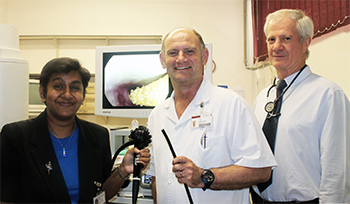Latest News Archive
Please select Category, Year, and then Month to display items
31 January 2024
|
Story EDZANI NEPHALELA
|
Photo ANJA AUCAMP
 Dr Martin Laubscher’s thesis, crowned with the Andrew Murray-Desmond Tutu Prize, is testament to the university’s unwavering commitment to scholarly excellence.
Dr Martin Laubscher’s thesis, crowned with the Andrew Murray-Desmond Tutu Prize, is testament to the university’s unwavering commitment to scholarly excellence.
In a historic triumph that reverberates over four decades since its inception, the UFS has clinched the coveted
Andrew Murray Prize – now renamed the Andrew Murray-Desmond Tutu Prize – for the first time. Standing shoulder to shoulder with institutions such as the University of Pretoria (UP) and Stellenbosch University (SU), this achievement marks a significant milestone in the UFS’ journey.
At the heart of this accomplishment lies the profound contribution of
Dr Martin Laubscher, distinguished Senior Lecturer specialising in Practical and Missional Theology in the
Faculty of Theology and Religion. Dr Laubscher’s dedication and scholarly prowess culminated in the groundbreaking work titled
Publieke teologie as profetiese teologie? (Public theology as prophetic theology), a revised edition of his doctoral thesis, which was originally crafted at Stellenbosch University in 2020, with a focus on the eminent Karl Barth.
Dr Laubscher received the Andrew Murray Prize for Theological Books in Afrikaans for his research and insightful analysis. The journey started when he realised, under the guidance of his study leader,
Prof Dion Forster, that his script had the potential to be published in Afrikaans. Sun Media’s interest in publishing this work in Afrikaans, led to it being the first-ever published thesis in Afrikaans. Dr Laubscher recalls, “I was grateful and excited about Sun Media’s interest. The book emerged within a year, and during a celebratory launch Prof Forster suggested I submit it for the Andrew Murray Prize.”
Earlier this year, Dr Laubscher was excited to learn that he was being shortlisted for the prestigious award. Reflecting on the significant moment, he shares, “The elation I felt upon receiving the news was unparalleled. I was not only celebrating a personal triumph, but also etching my name as the first laureate from our faculty to secure this prestigious accolade.”
Gastroenterology Unit works to bring a transformative impact to healthcare
2016-11-21

Dr Rita Nathan, Acting CEO of Universitas Hospital,
Prof Willem Kruger, Acting Head of the
School of Medicine, and Prof Jan van Zyl,
Head of Department of Internal Medicine.
Photo: Nonsindiso Qwabe
The departments of Surgery and Internal Medicine at the University of Free State launched the newly upgraded Gastroenterology Unit of the Universitas Academic Hospital on 8 November 2016. Realising the need to provide state-of-the-art equipment that caters for various health needs, the unit has acquired new pieces of equipment worth R7 million. Through the equipment, a move towards the digital revolution, the unit hopes to bring about a transformative impact on healthcare service delivery in central South Africa and its surrounds.
Upgraded unit will make a difference on burden of diseases
Dr Rita Nathan, Acting CEO of the Universitas Hospital, said the increase in the number of scopes, and the improvement in technology, will facilitate improved service delivery to the community of the Free State and beyond. “This upgrade will enable the unit to make a tremendous dent in the burden of diseases in the communities we serve.”
Unit a unique feature in central South Africa
Serving a population from the Free State, Northern Cape, Eastern Cape and Lesotho; the growing demand of health services has led to an increase in the number of patients treated by the unit. This unit is unique in central South Africa as the only one providing endoscopic intervention for cases like gastrointestinal bleeding. It is also the only 24-hour gastroscopic service available in the state sector.
Improved service delivery linked to enhanced training platforms
Prof Willem Kruger, acting head of the School of Medicine, said that the upgrading of equipment will have an immense impact on not only service delivery, but also on training platforms in the latest technologies. “It important, as a university, that our doctors have the latest technology at their disposal to facilitate training. If training improves, service delivery improves. The two on inextricably linked.” he said.